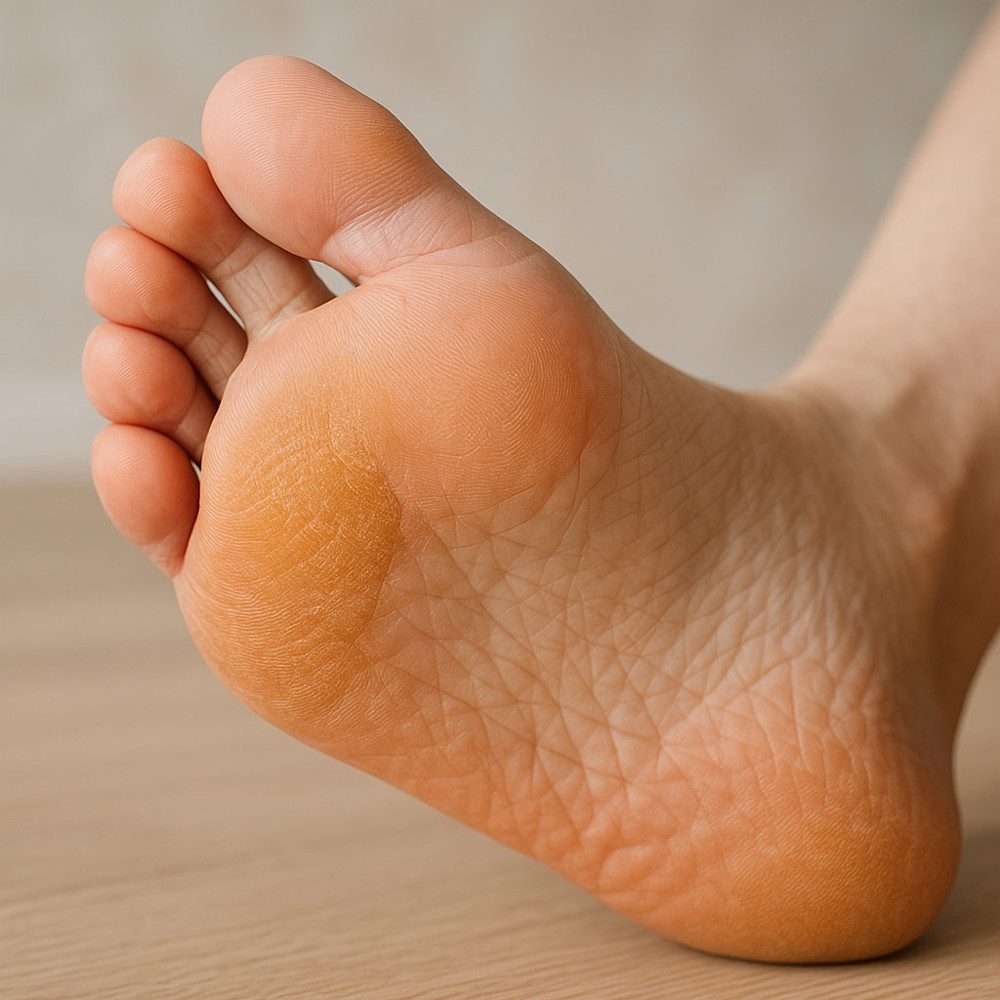What is callus?
Callus or callosity is thickened, hard skin on the underside of the foot caused by pressure and friction on the skin, which commonly occurs over the joints of your toes, the heels and the balls of your feet.

Callus
What are corns?
Corns are caused by pressure or friction over bony areas, such as a joint, and they have a central plug of hard skin which may cause pain if it presses on a nerve.
Corns
There are five different types of corns, the most common of which are either hard or soft corns:
- Hard corns – these are the most common and appear as a small area of concentrated hard skin up to the size of a small pea usually within a wider area of thickened skin or callus. This may be a symptom of the feet or toes not functioning properly
- Soft corns – these develop in a similar way to hard corns, but they are whitish and rubbery in texture and appear between the toes where the skin is moist from sweat or from inadequate drying
- Seed corns – these are tiny corns that tend to occur either singularly or in clusters on the bottom of the foot and are usually painless
- Vascular/neurovascular corns – these are corns that have both nerve fibres and blood vessels in them. They can be very painful and tender.
- Fibrous corns – these arise when corns have been present for a long time and are more firmly attached to the deeper tissues than any other type of corn. They may also be painful.
How can I prevent them?
Try the following to prevent corns and callus:
Do
Use a pumice stone or file on hard areas of skin being mindful of the fresh skin below.
Dry your feet after washing, particularly between the toes
If the area between the toes is moist, use surgical spirit. Apply it with a cotton bud to dry the area. Never use it on broken skin.
Wear clean and dry socks changing them daily.
Wear shoes that supportive, fit well and lace up or have Velcro to fasten them.
Relieve pressure between the toes with a foam wedge or toe sleeve.
Moisturise to help keep skin soft but avoid between the toes.
Don't
Use corn plasters that contains acids because this may result in a wound.
Use knives or blades.
Apply Foot cream between the toes.
If you have diabetes or circulation issues don’t use an electrical callus remover.
When to refer to podiatry?
If you have diabetes, an autoimmune condition, poor circulation, or a neurological condition, please seek advice from your podiatrist.
Podiatry would also like to see you if
- You have a breaks to the skin
- Have infection, discharge redness pain and swelling.
- Your painful corn reduces your ability to walk, and you have tried self-management
For more information, please follow these helpful links
Corns and calluses - NHS (www.nhs.uk)
Corns and Calluses: Causes, Prevention and Treatment (patient.info)
Accessible formats
If you require this information in a community language or alternative format such as Braille, audio, large print, BSL, or Easy Read, please contact the Equality and Human Rights Team at: email: fife.EqualityandHumanRights@nhs.scot or phone 01592 729130. For people with a hearing or verbal impairment you can also contact the team through the NHS Fife SMS text service number on 07805800005.
